翻译的语言对比规律(语义.词法.句法.思维)
- 格式:ppt
- 大小:216.50 KB
- 文档页数:49
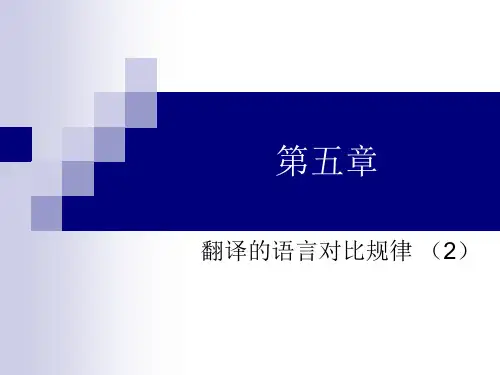
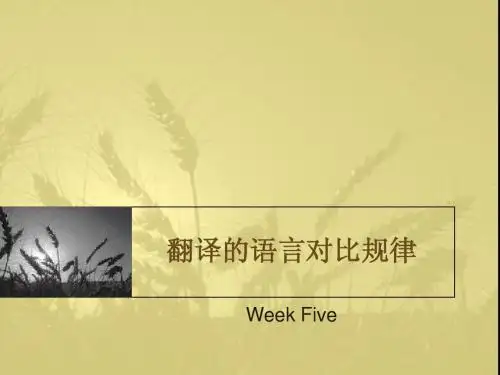
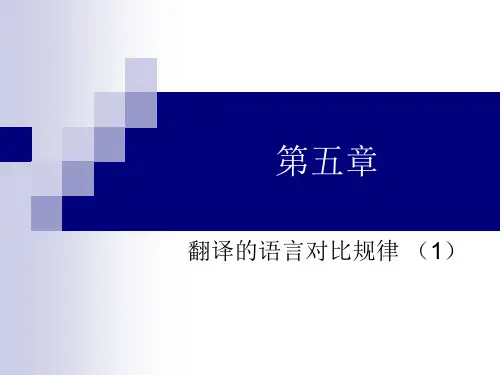
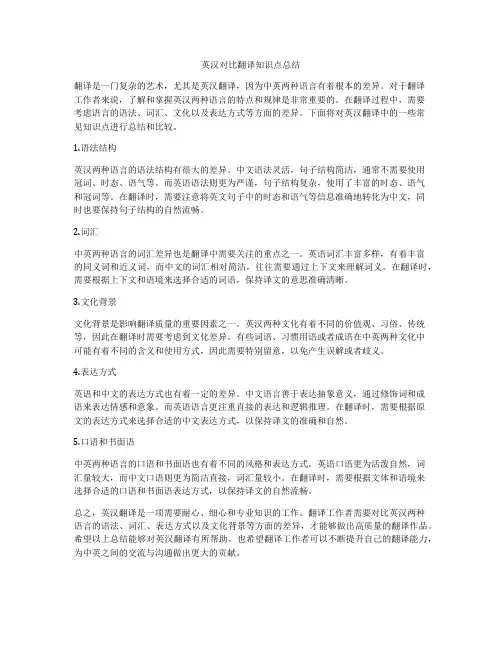
英汉对比翻译知识点总结翻译是一门复杂的艺术,尤其是英汉翻译,因为中英两种语言有着根本的差异。
对于翻译工作者来说,了解和掌握英汉两种语言的特点和规律是非常重要的。
在翻译过程中,需要考虑语言的语法、词汇、文化以及表达方式等方面的差异。
下面将对英汉翻译中的一些常见知识点进行总结和比较。
1.语法结构英汉两种语言的语法结构有很大的差异。
中文语法灵活,句子结构简洁,通常不需要使用冠词、时态、语气等。
而英语语法则更为严谨,句子结构复杂,使用了丰富的时态、语气和冠词等。
在翻译时,需要注意将英文句子中的时态和语气等信息准确地转化为中文,同时也要保持句子结构的自然流畅。
2.词汇中英两种语言的词汇差异也是翻译中需要关注的重点之一。
英语词汇丰富多样,有着丰富的同义词和近义词,而中文的词汇相对简洁,往往需要通过上下文来理解词义。
在翻译时,需要根据上下文和语境来选择合适的词语,保持译文的意思准确清晰。
3.文化背景文化背景是影响翻译质量的重要因素之一。
英汉两种文化有着不同的价值观、习俗、传统等,因此在翻译时需要考虑到文化差异。
有些词语、习惯用语或者成语在中英两种文化中可能有着不同的含义和使用方式,因此需要特别留意,以免产生误解或者歧义。
4.表达方式英语和中文的表达方式也有着一定的差异。
中文语言善于表达抽象意义,通过修饰词和成语来表达情感和意象。
而英语语言更注重直接的表达和逻辑推理。
在翻译时,需要根据原文的表达方式来选择合适的中文表达方式,以保持译文的准确和自然。
5.口语和书面语中英两种语言的口语和书面语也有着不同的风格和表达方式。
英语口语更为活泼自然,词汇量较大,而中文口语则更为简洁直接,词汇量较小。
在翻译时,需要根据文体和语境来选择合适的口语和书面语表达方式,以保持译文的自然流畅。
总之,英汉翻译是一项需要耐心、细心和专业知识的工作。
翻译工作者需要对比英汉两种语言的语法、词汇、表达方式以及文化背景等方面的差异,才能够做出高质量的翻译作品。

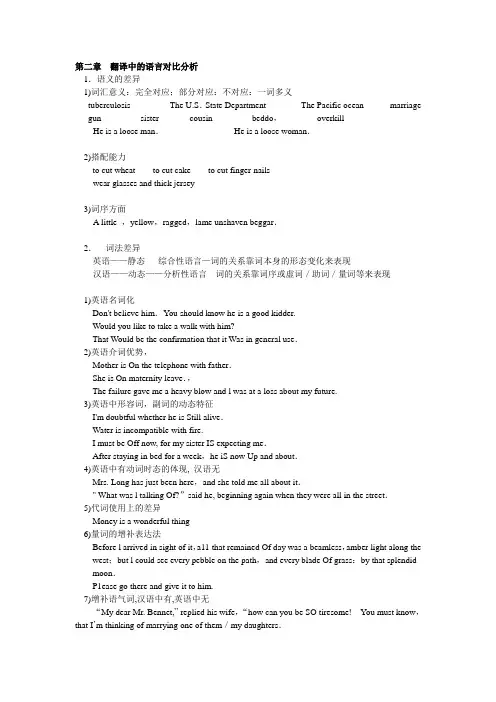
第二章翻译中的语言对比分析1.语义的差异1)词汇意义:完全对应;部分对应:不对应:一词多义tuberculosis The U.S.State Department The Pacific ocean marriage gun sister cousin beddo,overkillHe is a loose man.He is a loose woman.2)搭配能力to cut wheat to cut cake to cut finger-nailswear glasses and thick jersey3)词序方面A little ,yellow,ragged,lame unshaven beggar.2.词法差异英语——静态--- 综合性语言—词的关系靠词本身的形态变化来表现汉语——动态——分析性语言---词的关系靠词序或虚词/助词/量词等来表现1)英语名词化Don't believe him.You should know he is a good kidder.Would you like to take a walk with him?That Would be the confirmation that it Was in general use.2)英语介词优势,Mother is On the telephone with father.She is On maternity leave.,The failure gave me a heavy blow and l was at a loss about my future.3)英语中形容词,副词的动态特征I'm doubtful whether he is Still alive.Water is incompatible with fire.I must be Off now, for my sister IS expecting me.After staying in bed for a week,he iS now Up and about.4)英语中有动词时态的体现, 汉语无Mrs. Long has just been here,and she told me all about it." What was l talking Of?”said he, beginning again when they were all in the street.5)代词使用上的差异Money is a wonderful thing6)量词的增补表达法Before l arrived in sight of it,a11 that remained Of day was a beamless,amber light along the west;but l could see every pebble on the path,and every blade Of grass:by that splendid moon.P1ease go there and give it to him.7)增补语气词,汉语中有,英语中无“My dear Mr. Bennet,” replied his wife,“how can you be SO tiresome! You must know,that I’m thinking of marrying one of them/my daughters.3.句法的差异1) 形合与意合的差异The gate was opened, and the audience came crowding in.The more you give, the more you will get.If it insures a shop and then receives a suspicious claim, it will investigate the claim as ameans of protecting itself against false claims.It's easy to dodge a spear in the open, but hard to guard against an arrow shot from hiding.. ,A fall into the pit, a gain in your wit.Grasp all, lose all.Out of sight, out of mind.Man's warm blood makes it difficult for him to live along in the sea without some kind of warmth..With all its disadvantages this design is considered to be one of the best.2) 句序的差异Nothing has happened since we parted:As the weather was fine, we decided to climb the mountain.4.思维的差异1) 语篇的衔接与连贯Everywhere man is altering the balance of nature. He is facilitating the spread of plants and animals into new regions, sometimes deliberately, sometimes unconsciously. He is covering huge areas with new kinds of plants, or with homes, factories, slag-heaps and other productsof his civilization. He exterminates some species on a large scale, but favors the multiplicationof others,人类到处都在改变着自然界的平衡。
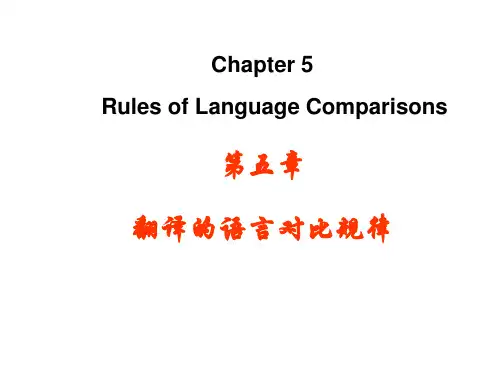
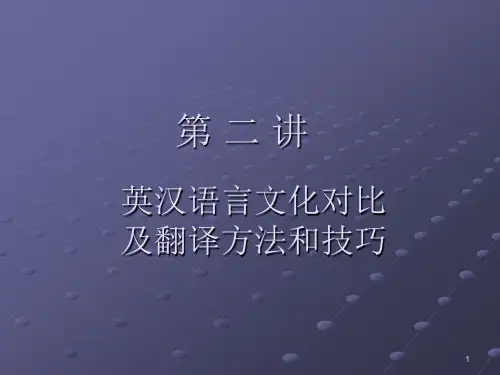

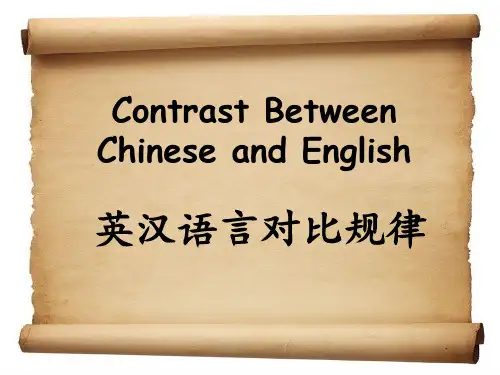
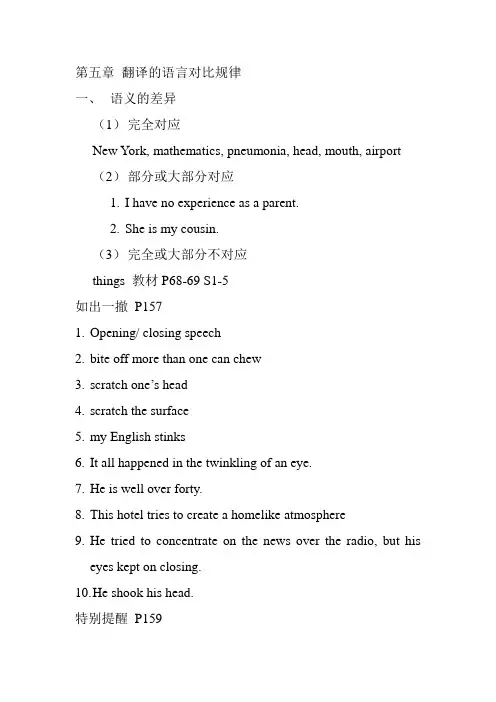
第五章翻译的语言对比规律一、语义的差异(1)完全对应New York, mathematics, pneumonia, head, mouth, airport(2)部分或大部分对应1.I have no experience as a parent.2.She is my cousin.(3)完全或大部分不对应things 教材P68-69 S1-5如出一撤P1571.Opening/ closing speech2.bite off more than one can chew3.scratch one’s head4.scratch the surface5.my English stinks6.It all happened in the twinkling of an eye.7.He is well over forty.8.This hotel tries to create a homelike atmosphere9.He tried to concentrate on the news over the radio, but hiseyes kept on closing.10.H e shook his head.特别提醒P15911.A ll of us know he ( the speaker) is a busybody.12.(not ) for love or money13.O ur firm is on the rocks.14.H e was quite at fault.15.H is fingers are all thumbs.大同小异P1591.National minority2.Sum total3.License suspension4.You should think twice before doing it.5.Some students like to burn the midnight oil.6.I’ll eat my hat/head/boots if …7.In no case will they look on with folded arms.8.That night they had a heart to heart talk.9.The committee sat on our proposal for several months.搁置10.I didn’t enjoy hot weather in summer, but we have to livewith it, don’t we?但是没办法11.H e just clammed up and wouldn’t talk.拒不开口搭配P1611.sound sleep sound judgment准确判断2.heavy rain / snow; heavy weather恶劣天气3.keep a diary keep/ observe Spring Festival过春节keep hens/pets4.instant coffee/ instant noodle审视角度P162fire engine fire hose tear gas dump truckdust cover reading lampcombination lock placement test pocket moneynext-door neighbor broad jumpstop watch borrowed prosperity思维方式P1621.the rush to learn English rush hours Christmas rush,football craze2.he has no ear for music3.The noise gets on my nerves.4.have a butterfly in the stomach.心里紧张5.Words and figures differ on this check.差异悬殊P1641.The employee was summarily dismissed.2.The murderer was arrested red-handed.3.Bad habits die hard.4.What’s done cannot be undone.5.It’s better to be the safe side.还是稳妥点好6.My husband sends me flowers once in a blue moon.千载难逢7.Today we have reached a stage of realizing that rivers can bepolluted past praying for.现在我们意识到河流受到污染可能已到了无法挽救的地步。
英汉语言翻译的比较英汉语言翻译的比较导语:翻译涉及到两种语言的转换,涉及到两种语言在表达某一文本的同一个内容时的各种表达方式。
这些表达方式,有的是相似的,有的是有差别的。
下面本文将从词汇、句子结构、篇章及文化四个方面对英汉两种语言差异进行对比分析。
一、英汉词汇对比与翻译英国翻译理论家Newmark曾说:“文本翻译的大多数工作都是在词汇层面上完成的”。
许多学习者在翻译时逐字逐句地把汉语翻译成对应的英语,从而导致“中国式英语”现象的频繁发生,其根本原因是受到了汉语的干扰。
英汉词汇可以从以下几个角度进行对比:(一)词义比较1.词的多义性英语词义比较灵活,词的涵义范围比较广,词义对上下文的依赖性较大,而汉语词义比较严谨,凝滞,词的含义范围比较窄,词的意义比起英语词义对上下文的依赖性比较少。
英语一向被认为是一种适应性、可塑性较强的语言。
Eric Partridge: Words do not have meanings; people have meanings for words.(词本无义,义随人意。
)英语词义灵活,突出地表现为一词多义。
例如:“story”这个词,汉语的词义是“故事”,但在英语中,在不同的上下文中却有不同的词义。
如:2.抽象与具体英语表达中常使用抽象名词,这类名次涵义抽象笼统,往往给人以一种“虚、暗、曲、隐”的感觉。
而汉语用语倾向于具体,常常以实的形式表达虚的概念,以具体的形象表达抽象的.内容,并给人以一种“实、明、直、显”的感觉。
3.静态与动态英语常用静态词汇,具体体现在较多的适用名词和形容词。
而汉语则多使用动态词汇。
如:He is a good eater and a good sleeper.他能吃又能睡。
4.构词法(1)英语主要构词法有派生、转化和合成三种,汉语主要有派生、转化、合成、重叠四种。
(2)英语派生可用于名词、动词、形容词等,汉语派生只用于名词。
(3)重叠是汉语主要构词法之一,英语则无重叠法。
英汉语言特点对比与翻译世界因差异而丰富多彩,长期以来,英汉民族在价值观念、宗教信仰、民情风俗、历史背景、地理条件、社会制度、生活经验等方面存在着巨大差异,这些差异不仅给各自的文化载体打上了深深的烙印,形成了独具风格的语言与文化,同时也为这两种语言之间互译带来了重重困难。
本文主要在逻辑和语法两方面对英语和汉语的特点进行比较和分析,探寻英汉语言互译的策略与方法。
一、逻辑对比1. 主观与客观汉语在表达上注重主体意识,而英语强调倾向于客体。
因此,汉语常用人或物作主语,多用主动语态,有时还会省略主语。
英语则较多用非人称主语结构,被动句与主动句并重,主语一般不省略。
Eg: The news of any old pal’s death will invariably make me sad in my heart for a long, long time. 我每当听到一个旧友死去是消息,总要惆怅多时。
2. 动态与静态汉语中喜用动词,经常会有多个动词并列出现,英语则常常通过动词的派生、转化、弱化和虚化等手段,采用非动词的形式(如名词、介词、形容词、副词等)表达动词的意义,因而表达呈静态。
Eg : He is a good eater and a good sleep. 他能吃能睡。
3. 具体与抽象抽象表达法在英语里使用得相当普遍, 主要见于大量使用抽象名词,用来表达复杂的思想和微妙的情绪,英语中丰富的词义虚化手段,也大大方便了抽象表达法的使用。
与英语相比,汉语用词倾向于具体,常常以实的形式表达虚的概念,以具体的形象表达抽象的内容,往往采用如下的手段:用动词取代抽象名词;用范畴词使抽象概念具体化;用具体的词语阐释抽象的词义;用形象性词语使抽象意义具体化(如比喻、成语、谚语、歇后语等)。
Eg: I talk to him with brutal frankness. 我对他说的话,虽然逆耳,却是忠言。
4. 肯定与否定汉英逻辑思维差异的另一方面体现在表达时肯定与否定的运用。